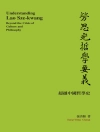Deepens our understanding of this contemporary Chinese thinker’s philosophy and its significance.
Li Zehou (1930–2021) was one of China’s most prominent contemporary philosophers, transforming Confucian philosophy into a resource for positive change. From a critical rereading of the Analects to a formulation of his own aesthetic theory, Li reinterpreted the tradition from earliest times down to the present day. In this effort, he was inspired by Marx and Kant but was neither a Marxist nor a Kantian. Nor was he a Confucian. He was, and remains, an original: the philosopher Li Zehou.
In this volume, Chinese, European, and US scholars explore Li’s contributions to Chinese philosophy and culture, deepening our understanding of his philosophy and its significance while also celebrating the intellectual diversity and richness of Chinese philosophical thought. In a passionate and dedicated endeavor to ensure that Li’s philosophy endures and continues to inspire scholars, particularly the younger generation of academics, both in China and around the world, the volume aims to serve as a catalyst for ongoing scholarship and discourse on the work of the philosopher Li Zehou.
Innehållsförteckning
Introduction 1
Jana S. Rošker and Roger T. Ames
Part 1: Li Zehou, the Philosopher
1. Li Zehou, Wily Provocateur
Michael Nylan
2. Li Zehou in the Tradition of Masters and Commentators
Paul J. D’Ambrosio
3. A New Alternative to the How-to-Live Concern
Wang Keping
Part 2: Culture in the Mirror of History
4. Sedimentation and Gene-Culture Coevolution
Jordan B. Martin
5. Situated Cognition and Historical Perspective: Li Zehou and Contemporary Aesthetics
Rafal Banka
Part 3: Freedom, Autonomy, and Justice
6. Autonomy and the Nature of Ruist Morality: Li Zehou and Mou Zongsan
David Elstein
7. Justice, Harmony, and the Good Life of Guanxi: Li Zehou’s Response to Liberalism
Andrew Lambert
8. A Deep Harmony Account of Justice
Chenyang Li
Part 4: Humanist Harmony and Limitless Equilibrium
9. Emotion as Substance: A Concrete Humanist Moral Framework
Robert A. Carleo III
10. Measure Without and Beyond Measure: Brief Notes on the Primary Category of Li Zehou’s Anthropologico-Historical Ontology
Wu Xiaoming
11. A Post-Marxian Dialogue on the Subject–Object Relation: Li Zehou and Adorno on the Dialectics of Aesthetic Subjectivity
Jana S. Rošker
Part 5: From Aesthetics to Ethics
12. Li Zehou on the Distinction and Interaction between Ethics and Morality
Jinhua Jia
13. The Philosophy of Beauty as an Ethics of Freedom: From Kant to Li Zehou; Perspectives of an Attractive Line of Thought
Gregor Paul
14. Li Zehou’s Major Works on Chinese Aesthetics: The Path of Beauty and The Chinese Aesthetic Tradition
Karl-Heinz Pohl
Part 6: Discursive Dialogues
15. The Origins of Chinese Culture and the Question of Shamanism: Li Zehou and Xu Fuguan
Maja Maria Kosec
16. Fruits of Practice: A Comparative Analysis of Li Zehou’s Concept of Sedimentation and the Buddhist Idea of the Transformations of Storehouse Consciousness (Alaya)
Dawid Rogacz
17. Number and Mathematics in Li Zehou’s Critique of Critical Philosophy
Sydney Morrow
Li Zehou’s Key Works: A Comprehensive Chronological Bibliography of His Most Significant Publications
Contributors
Index
Om författaren
Roger T. Ames is Humanities Chair Professor in the Department of Philosophy at Peking University. His published works include translations of the Chinese philosophical canons and several interpretive studies.












